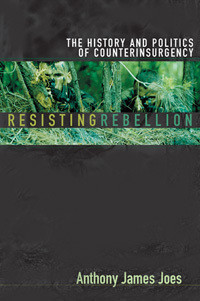Google Books previews are unavailable because you have chosen to turn off third party cookies for enhanced content. Visit our cookies page to review your cookie settings.
Resisting Rebellion (Paperback)
The History and Politics of Counterinsurgency
Imprint: University Press of Kentucky
Pages: 360
ISBN: 9780813191706
Published: 18th August 2006
Script Academic & Professional
Pages: 360
ISBN: 9780813191706
Published: 18th August 2006
Script Academic & Professional
Please note this book may be printed for your order so despatch times may be slightly longer than usual.
You'll be £27.00 closer to your next £10.00 credit when you purchase Resisting Rebellion. What's this?
+£4.99 UK Delivery or free UK delivery if order is over £40
(click here for international delivery rates)
Need a currency converter? Check XE.com for live rates
(click here for international delivery rates)
Need a currency converter? Check XE.com for live rates
In Resisting Rebellion, Anthony James Joes explores insurgencies ranging across five continents and spanning more than two centuries. Analyzing examples from North and South America, Europe, Africa, and the Middle East, he identifies recurrent patterns and offers useful lessons for future policymakers. Insurgencies arise from many sources of discontent, including foreign occupation, fraudulent elections, and religious persecution, but they also stem from ethnic hostilities, the aspirations of would-be elites, and traditions of political violence. Because insurgency is as much a political phenomenon as a military one, effective counterinsurgency requires a thorough understanding of the insurgents' motives and sources of support. Clear political aims must guide military action if a counterinsurgency is to be successful and prepare a lasting reconciliation within a deeply fragmented society. The most successful counterinsurgency campaign undertaken by the United States was the one against Philippine insurgents following the Spanish-American War. But even more instructive than successful counterinsurgencies are the persistent patterns of errors revealed by Joes's comparative study. Instances include the indiscriminate destructiveness displayed by the Japanese in China and the Soviets in Afghanistan, and the torture of suspected Muslim terrorists by members of the French Army in Algeria. Joes's comprehensive twofold approach to counterinsurgency is easily applied to the U.S. The first element, developing the strategic basis for victory, emphasizes creating a peaceful path to the redress of legitimate grievances, committing sufficient troops to the counterinsurgent operation, and isolating the conflict area from outside aid. The second element aims at marginalizing the insurgents and includes fair conduct toward civilians and prisoners, systematic intelligence gathering, depriving insurgents of weapons and food, separating insurgent leaders from their followers, and offering amnesty to all but the most incorrigible. Providing valuable insights into a world of conflict, Resisting Rebellion is a thorough and readable exploration of successes and failures in counterinsurgency's long history and a strategy for the future.
Other titles in University Press of Kentucky...















